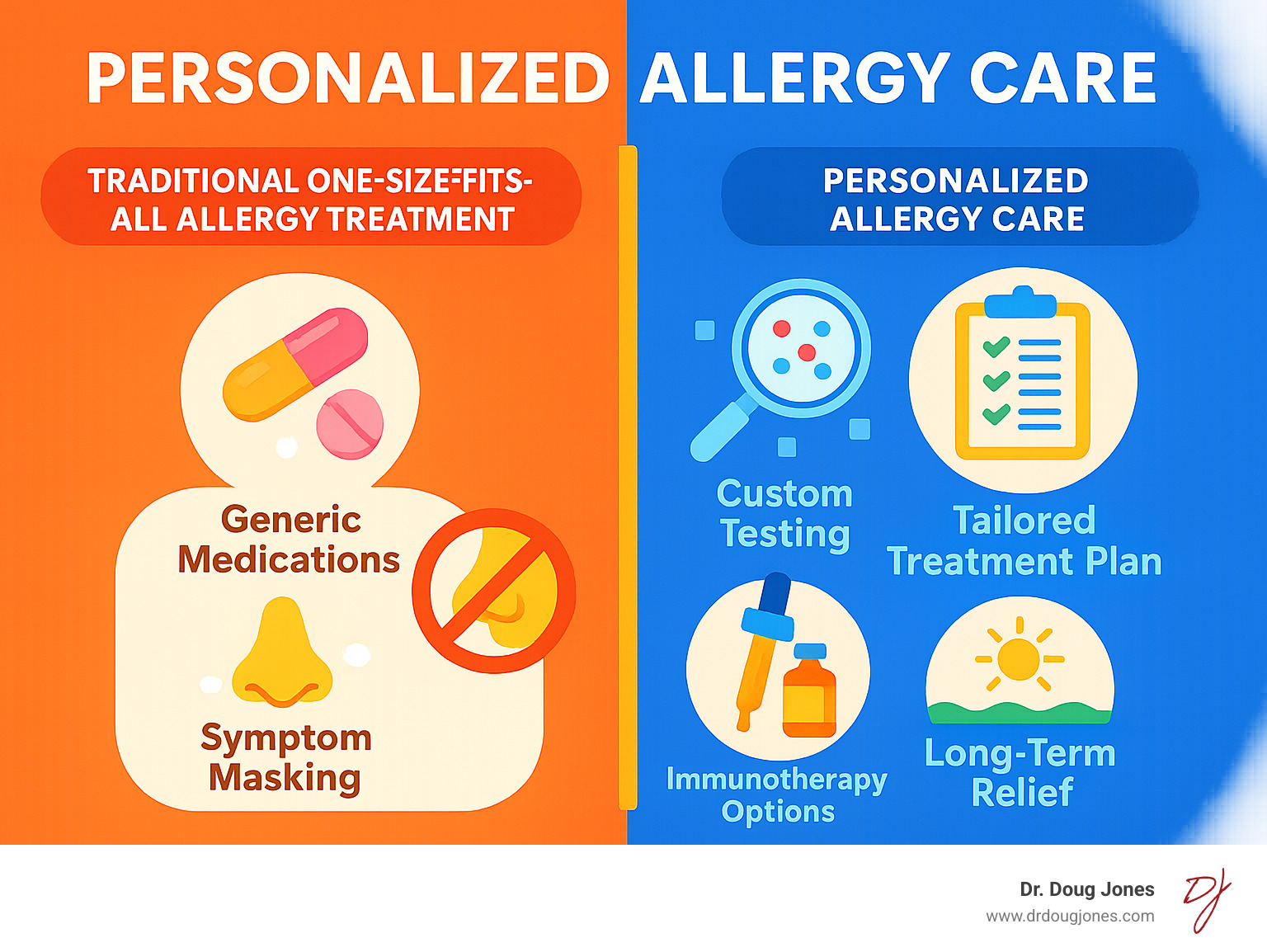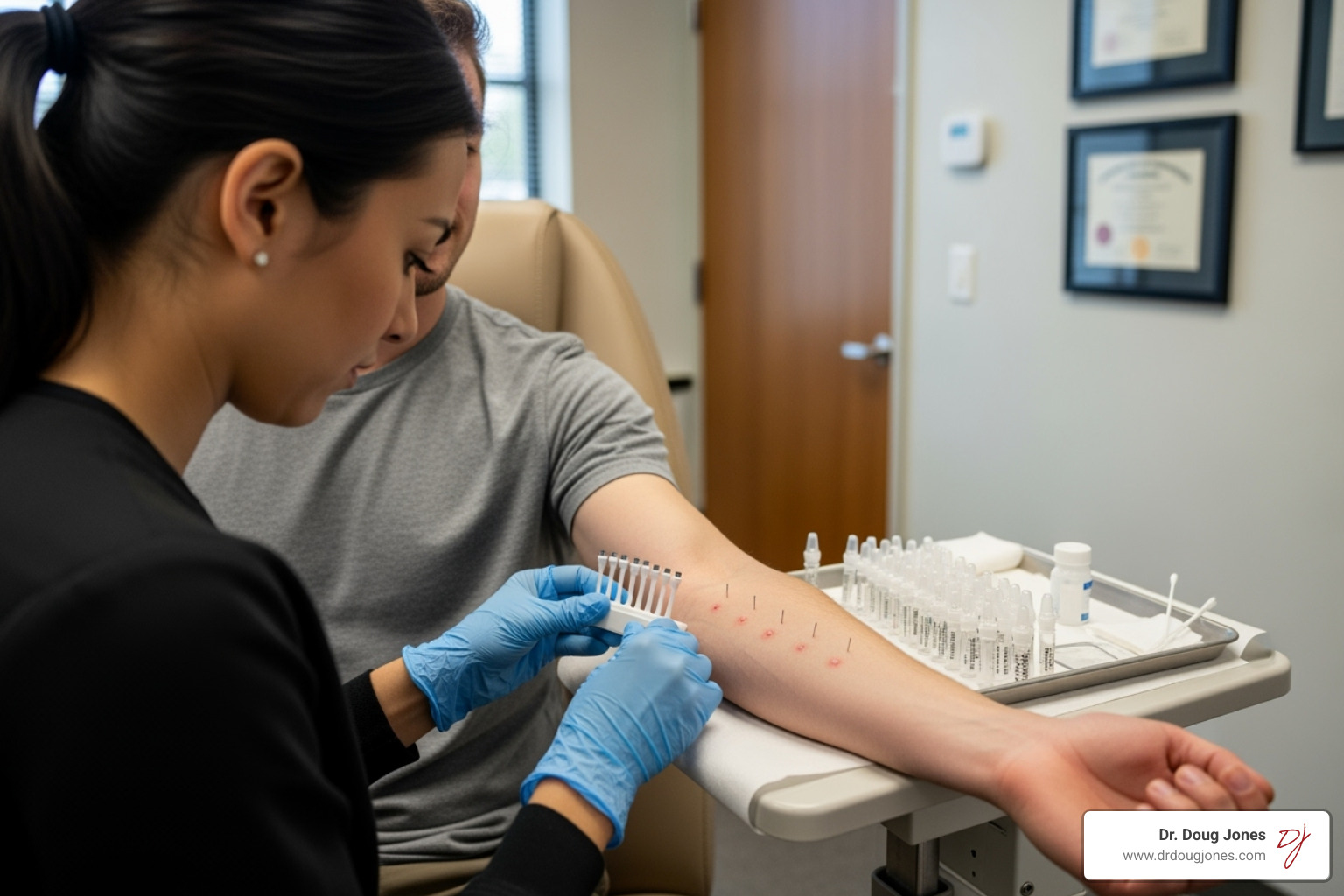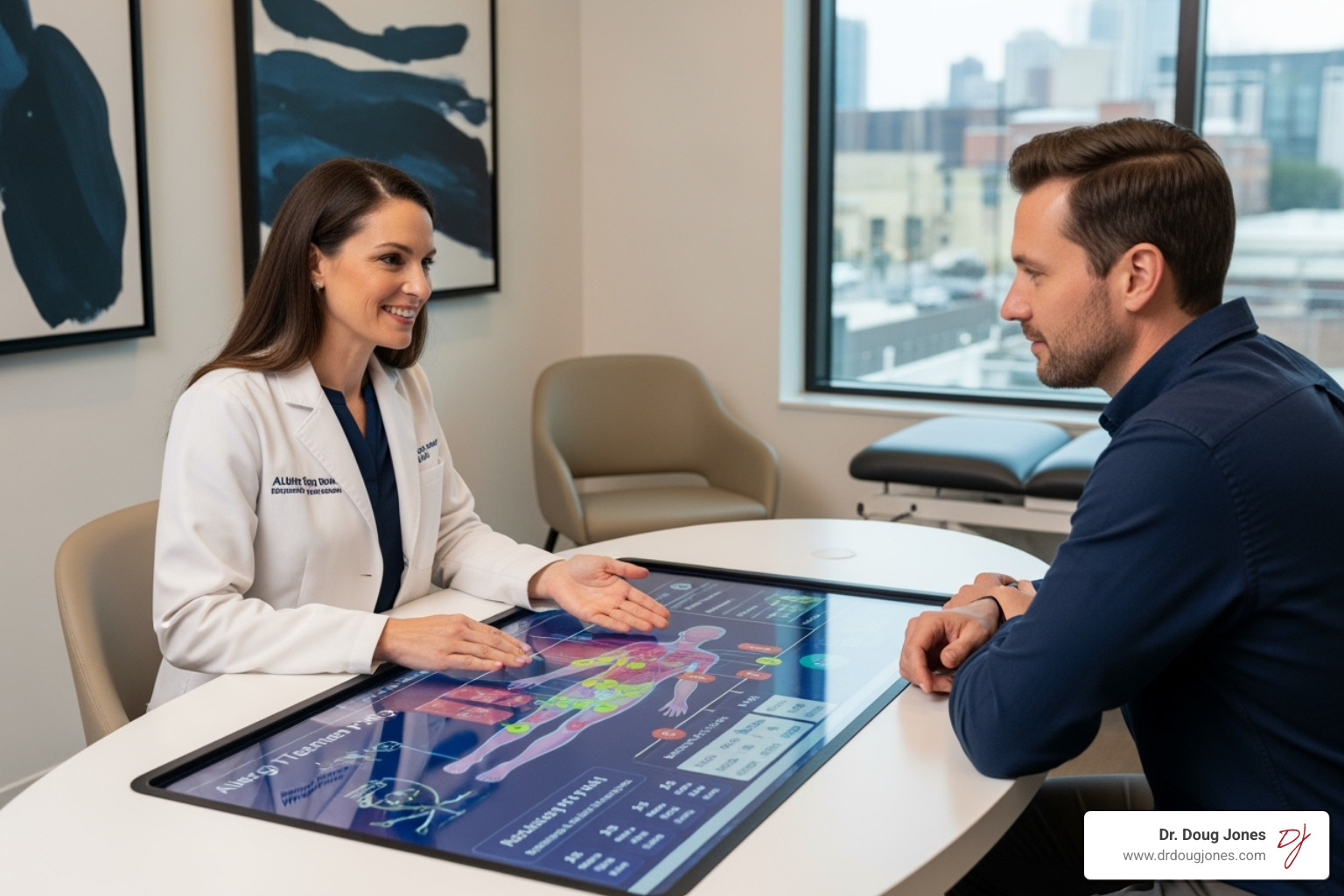Why Personalized Allergy Care is Revolutionizing Allergy Treatment
Personalized allergy care is an individualized approach that treats the root causes of your allergies, moving beyond masking symptoms with generic medications.
Key Features of Personalized Care:
- Custom treatment plans based on your specific triggers.
- Precision testing to identify exact sensitivities.
- Custom multi-ingredient medications for targeted relief.
- Immunotherapy options (shots, drops, or oral) to retrain your immune system.
- Integrated management of related conditions like asthma and eczema.
- Long-term relief that reduces dependence on daily medications.
Allergy management costs the U.S. an estimated $4.5 billion annually, yet over half of sufferers find their treatments ineffective. The problem is the reliance on one-size-fits-all treatments that only provide temporary relief without addressing the underlying cause.
Personalized allergy care changes this by using precision medicine to create a unique treatment plan. Research shows that 90% of patients report superior relief with personalized multi-ingredient treatments compared to previous solutions. This approach focuses on disease modification, retraining your immune system to become less reactive over time for lasting relief.
I'm Dr. Doug Jones, a board-certified immunologist who has spent over a decade developing personalized allergy care for patients with complex immune conditions like food allergies, long COVID, and chronic immune challenges. Through my practice at GAIN - Global Allergy Immune Network, I've seen how this approach transforms lives by addressing root causes. Instead of a "one-size fits all" approach, I aim to "find the size that fits the one."

What is Personalized Allergy Care and Who Needs It?
Personalized allergy care means getting a treatment plan designed for your body's unique immune fingerprint. Instead of just quieting symptoms for a few hours, this approach asks why your immune system is overreacting and how we can retrain it to stop treating harmless substances like invaders.
This comprehensive approach addresses the full spectrum of allergic conditions—from allergic rhinitis (hay fever) and asthma to eczema, food allergies, and chronic sinusitis—as connected pieces of your immune puzzle. The results are significant, with research showing that 90% of patients experience superior relief compared to standard treatments.
Who is a Good Candidate for Personalized Allergy Care?
Almost everyone with allergies can benefit, but certain groups see the most dramatic improvements.

- Children: A child's developing immune system offers a unique opportunity to change their allergy trajectory. We create plans that work with school schedules and include family education.
- Adults: Many adults are frustrated after years of trial and error with medications. Personalized care can break this cycle.
- Seniors: As bodies age, medication sensitivities can change. We adjust treatments to ensure they remain safe and effective.
- Hormonal Influences: Pregnancy and menopause can alter allergy patterns. We factor these hormonal shifts into every treatment plan.
- Individuals with Comorbidities: If you have related conditions like asthma and allergies or eczema and allergies, an integrated approach that addresses how they influence each other is far more effective.
- Patients with Severe Symptoms: If you've tried everything without long-term success, this approach offers hope for real change.
Conditions Addressed by a Personalized Approach
We look at your whole immune picture, not just the most obvious symptoms.
- Environmental and Respiratory Allergies: We treat allergic rhinitis (runny nose, sneezing), nonallergic rhinitis, asthma, and chronic sinusitis, often together for better results.
- Skin Conditions: Atopic dermatitis (eczema), urticaria (hives), and contact dermatitis are all windows into your immune system's behavior.
- Food Allergies: These require a high level of precision and safety, including advanced testing to determine what you can safely eat.
- Penicillin Allergy: Many people are incorrectly labeled as allergic to penicillin. Proper testing can often "delabel" this allergy, giving you access to more effective antibiotic options.
The Foundation: Precision Diagnostics and Evaluation
Personalized allergy care begins with a thorough investigation into your unique case. We're not just looking for what makes you sneeze; we're uncovering the whole story of how your immune system behaves.
Your journey starts with a comprehensive history-taking, where we use symptom scores and quality of life assessments to understand how allergies impact your world. It may be surprising, but allergy testing isn't always required before starting treatment. If your symptoms paint a clear picture, we can often begin treatment right away while gathering more information.

What to Expect During Your First Visit
To help us solve your case, please bring a symptom diary, any previous test results, and a complete list of medications (including prescriptions, OTCs, and supplements). We will conduct a medical history review, discuss your family history, and perform an environmental exposure assessment and physical examination to get a complete picture of your health.
Advanced Allergy Testing Methods
When testing is needed, we use a variety of methods to pinpoint your triggers.
- Skin Testing: The skin prick test is a quick way to check for reactions to common allergens. Intradermal testing is used for more subtle cases.
- Patch Testing: This test identifies delayed reactions to chemicals or fragrances that cause contact dermatitis.
- Blood Testing: Serum IgE testing measures allergen-specific antibodies in your blood. For complex food allergies, component-resolved diagnostics (CRD) can break down allergens to assess your risk of severe reactions.
- Lung Function Tests: Spirometry helps diagnose and monitor asthma, while Fractional exhaled nitric oxide (FeNO) measures airway inflammation with a simple breath test.
For more on clinical guidelines, you can listen to this Deep Dive into Allergic Rhinitis Guidelines.
Assessing and Managing Comorbidities
Allergies rarely travel alone and often follow a pattern called the atopic march (eczema, then food allergies, then rhinitis and asthma). We develop integrated plans for asthma, sinus disease, and atopic dermatitis, coordinating with other specialists like ENTs, pulmonologists, and dermatologists as needed. This holistic view of immune health is what makes personalized care so effective.
The Core Components of Personalized Allergy Care
This is where we create your custom treatment plan. It involves tailoring doses, adjusting combinations of medications, and changing delivery methods to maximize effectiveness. We also account for seasonal changes with pre-season priming and pollen calendars. Proper technique for using nasal sprays and inhalers is crucial, as poor technique can reduce effectiveness by up to 50%.
Creating Your Personalized Allergy Care Treatment Strategy
Your strategy will draw from a toolkit of pharmacologic options chosen for your specific symptoms. These may include intranasal steroids, antihistamines, decongestants, leukotriene modifiers, ophthalmic drops, inhalers for asthma, or advanced biologics for severe cases.
Where personalized care truly excels is with multi-ingredient nasal sprays. These custom formulations can include up to 4 active ingredients in a single bottle, targeting your unique symptoms. This approach is backed by extensive research, with 18+ peer-reviewed publications supporting it. Critically, 90% of patients experienced nearly-complete or fully-complete relief with customized therapy. This allows us to adjust therapy over time, matching your treatment to your symptoms and the season.
When Immunotherapy is the Right Choice
Immunotherapy retrains your immune system to tolerate allergens, offering true disease modification rather than just symptom suppression. By gradually exposing your body to what you're allergic to, we can build tolerance for long-term relief.
There are several types of immunotherapy: Subcutaneous immunotherapy (SCIT) (allergy shots), Sublingual immunotherapy (SLIT) (under-the-tongue drops/tablets), and Oral immunotherapy (OIT) for food allergies.
FeatureSubcutaneous Immunotherapy (SCIT)Sublingual Immunotherapy (SLIT)Oral Immunotherapy (OIT) (for Food Allergy)How it WorksInjections of allergen extractsDrops/tablets of allergen extracts under the tongueIngestion of increasing amounts of allergenic foodAdministrationIn-office injections (by healthcare professional)At-home (self-administered)At-home, after initial in-clinic dosingDurationTypically 3-5 years for long-term benefitTypically 3-5 years for long-term benefitVariable, often years to achieve sustained unresponsivenessSafetyLow risk of systemic reaction, monitored in clinicVery low risk of systemic reaction, mild local reactionsHigher risk of systemic reaction, requires strict supervisionCommon UsesEnvironmental allergies (pollen, dust mites, pets)Environmental allergies (pollen, dust mites, grass)Specific food allergies (e.g., peanut, milk, egg)ConvenienceRequires regular clinic visitsHigh, self-administered at homeModerate, requires careful food measurement and adherence
Safety is our top priority. Treatment typically lasts 3-5 years, with many patients noticing improvements within months. The goal is lasting relief that reduces or eliminates the need for daily medications. For more on related therapies, see this Scientific research on Immunoglobulin Replacement.
Advanced Procedures for Specific Allergies
For food allergies, we offer supervised oral food challenges (OFC), the gold standard for diagnosis. This involves carefully introducing a potential allergen under medical supervision to confirm or rule out an allergy.

For drug allergies, penicillin allergy testing and delabeling is a key service. Many people are incorrectly labeled with a penicillin allergy, limiting their treatment options. Through careful testing, we can often remove this label, which improves antibiotic choices for future infections.
Your Journey to Lasting Relief
We design our personalized allergy care to fit your life. Through virtual visits, remote monitoring, and a 24/7 messaging system via our digital patient portals, you can connect with our team from anywhere. We track your progress by monitoring symptom scores and peak flow readings, but our main focus is on your quality of life. Are you sleeping better and enjoying activities again? These are the improvements that matter.
The goal is to give you your life back. You can learn more at More info about our services.
How a Pediatric Personalized Allergy Care Plan is Different
Children require a special approach. Our pediatric plans are built on family education and detailed school action plans. We coordinate directly with school nurses to ensure your child's safety. With a child visiting the ER for an allergic reaction every 10 minutes, our focus is on prevention and empowering children and teens with age-appropriate skills to manage their own health.
Creating an Emergency Action Plan for Anaphylaxis
Anaphylaxis is a severe allergic reaction, but a clear plan removes the fear. We teach you to recognize the warning signs, from skin rashes to trouble breathing.
The rule for when to use epinephrine is simple: at the first sign of a serious reaction. Do not wait. Epinephrine is your first line of defense.

We ensure you are comfortable using an epinephrine auto-injector and provide a written emergency plan. This plan should be shared with family, school staff, and caregivers to create a network of safety around you.
Understanding Costs, Coverage, and Cultural Factors
We help you steer insurance coverage and use HSA/FSA accounts. While personalized care may have a higher upfront cost than OTC medications, it often saves money long-term by reducing sick days, ER visits, and the cost of ineffective treatments. We also take the time to understand your cultural background, language, and lifestyle, as the best treatment plan is one you can successfully follow.
Frequently Asked Questions about Personalized Allergy Care
How is personalized allergy care different from just taking over-the-counter medicine?
Over-the-counter (OTC) medicines are a temporary patch; they mask symptoms without addressing the root cause. Personalized allergy care is different. We identify your specific triggers and create custom treatments that can retrain your immune system over time. This focus on long-term disease modification means many patients find they need fewer medications and can achieve lasting relief. It's the difference between turning up the radio to drown out a noise and actually fixing the engine.
How long does it take to see results from immunotherapy?
Results vary, but many patients notice some improvement within the first few months. However, the full effect of immunotherapy—the kind of relief that can last for years after treatment ends—typically takes 3 to 5 years. Your immune system needs this time to learn that allergens aren't a threat. The dedication is worth it for the long-lasting benefits.
What are the common side effects of allergy treatments and how are they managed?
Like any treatment, side effects are possible, but we actively manage them. For medications, common issues like drowsiness or dry mouth can be managed by adjusting the dose or switching to a different drug. For immunotherapy, side effects are generally mild. Allergy shots may cause local redness or swelling at the injection site, while sublingual drops might cause mild oral itching. We manage these with pre-medication and careful dose adjustments. The risk of a severe reaction like anaphylaxis is very low, and we are fully prepared to handle it in our office.
Conclusion: Take Control of Your Allergies
Personalized allergy care is a fundamental shift away from the cycle of generic treatments that only mask symptoms. It's a comprehensive, evidence-based approach that treats you as an individual.
Our approach centers on empowerment, education, and long-term wellness. We equip you with knowledge about your body and a customized plan to help you take control. Patients experience improved symptom control, better sleep quality, reduced absenteeism from work and school, and a dramatically improved quality of life.
My approach through GAIN - Global Allergy Immune Network embodies functional and integrative immunology, looking at your whole health picture. I've dedicated my career to redefining how we approach complex immune challenges, from food allergies to long COVID.
If you're tired of treatments that don't work and are ready for lasting relief, there is hope. Every person's immune system tells a different story, and I'm here to help you understand yours.
Take the first step toward lasting relief. Inquire about a consultation and let's explore how personalized care can transform your relationship with allergies forever.






.png)